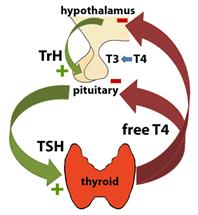The whole area of TSH testing has been discussed, criticised, acclaimed, and generally confused for years. Here is an interesting article which is, in my view, well worth reading.
Thyroid-Stimulating Hormone
Why Efforts to Harmonize Testing Are Critical to Patient Care
By James D. Faix, MD, and Linda M. Thienpont, PhD
Thyroid disease is common in the general population, and its prevalence increases with age. Because the signs and symptoms of the disease often resemble other disorders, before initiating treatment physicians need to determine whether the patient actually has thyroid disease or something else. The test most frequently ordered to test thyroid function is thyrotropin, commonly referred to as thyroid-stimulating hormone (TSH). Based on the functional interrelationship of the hypothalamus, pituitary gland, and thyroid, TSH should be elevated if the thyroid gland is not producing adequate thyroid hormone, and suppressed if it is producing too much (Figure 1). Today, however, we are beginning to realize that this well-established paradigm for TSH synthesis and release is an oversimplification.
<much much more by following link>
aacc.org/publications/cln/2...
Rod
Picture shows basic role TSH takes in thyroid hormone control

